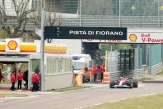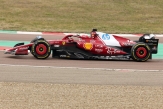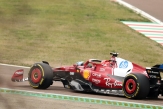Ферари за Бахрейн
Себастиан Фетел:
The Sakhir circuit has always been very demanding for the drivers and the cars. From inside the car, the ambient temperature is a feature, because in this desert location, at some parts of the day the heat can be very high.
The characteristics of the track put a premium on traction and also provide a stern test for the brakes, which come under a lot of stress over the course of a lap. It’s what we drivers call a stop-go track because you are continually having to brake heavily and then accelerate hard. We never raced in Bahrain this late in the year, but it won’t change very much in terms of the temperatures.
We’ve seen that the car has improved over the past few races and I’m keen to see how competitive we can be at this track.
Шарл Льоклер: The Bahrain Grand Prix is quite unusual in that, because of various factors, the situation changes continuously over the course of the weekend. In the first sessions, the track is very dirty from all the sand that blows across its desert location. Bit by bit as the track cleans up, its abrasive nature gives the tyres a hard time.
The light and temperature also change all the time, starting at dusk on a very hot track and the sun low in the sky, but as the race goes on, the track temperature drops and you have to adapt your driving style.
I’ve got good memories of last year, even if it didn’t end as well as it could have done. I hope we can continue the trend of the last few races in which we have been more and more competitive.
Лоран Мекис: Never before, in the history of Formula 1, has the season ended with three races on consecutive weekends. With the championships decided, there is still a close battle for third place in the Constructors’ classification with four teams within 24 points of one another. Scuderia Ferrari picked up 27 in Turkey, thus closing the gap to third place, although the team is still sixth. We asked Sporting Director Laurent Mekies what is the mood in the team as it prepares for this final stint in the Middle East.
It will be an unusual end to a very unusual season which was a very tough one for us. Our aim is to carry on making up ground in terms of our performance when compared to those teams we are fighting with this year and that has been on-going for the last five races now.
From an organisational point of view, what problems does a triple-header throw up, especially one outside Europe?
Our first priority is the health of the team, which is an area where you must never lower your guard. We have to ensure that everyone is in good shape given the strain of having already had 14 races in four months. I feel that the support of those working back in Maranello will be vital in helping those at the track. Every little detail that can help improve our performance will be important so as to finish this season on a high and to fine tune our working methods, making them more efficient for next year.
How physically and mentally demanding has this season been for those working at the track?
There’s no denying it’s been really tough. The situation created by the pandemic and the fact our performance was poor at the start of the season made life difficult. But everything we have been through has made us stronger, we have not lost our bearings, we never gave up and we always wanted to fight back and improve. I would praise the men and women in the race team for their resilience and the spirit they showed in such difficult times, as well as their families who played a vital role. I would also like to thank the fans who have always been there with us, mainly in spirit as, in most cases they were not allowed to attend the races.
In terms of physical training and diet have you taken any special measures?
Yes, we have a tailor-made plan for those who travel to races in terms of their medical, nutritional and physical wellbeing. Although the restrictions caused by the pandemic have made life complicated, we have not reduced our efforts in this year, quite the opposite. The health and wellbeing of our people is vital, especially in light of the increased physical and mental stress we have faced this season. And specifically, we have arranged a fitness programme for these last three races.
However, the race team’s season doesn’t end with the Abu Dhabi GP on 13 December, as two days later, the same Yas Marina circit hosts the young driver test. What are Ferrari’s aims for this final piece of track action?
I have to start by congratulating the Ferrari Driver Academy students who have all done very well this season. Three of them, Mick Schumacher, Callum Ilott and Robert Shwartzman, will be on track with other teams, while Antonio Fuoco, who works for us in the simulator, will drive our car to get an important idea of the correlation between data from the track and the simulator. We believe Mick, Callum and Robert have what it takes to do well in Formula 1 and our programme is designed to give them the best possible chance to do so. The test will be another important step in their education and we are very keen to see them perform on track, before working with them back in Maranello over the winter.






























.jpg)
.jpg)
.jpg)












02/12/2025 от Огнян Тенчев (drJeckyll), няма коментари